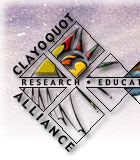




 |
Welcome | People | Research | Education | Training | Links |  |
|||
 |
 |
||||
 |
|||||
Training and Capacity Building Initiatives |
|||||
|
|
Iisaak Sustainable Forestry ProjectProject leaders: Stan Boychuk, Gypsy Wilson The first component of this monitoring and capacity building program iteratively analyzes a suite of criteria and indicators, with associated measures and methodologies, to gain information on both ecological and social pattern and process. Assessment information is fed back into Iisaak Forest Resources' planning and practice, to guide management decisions adaptively and to achieve sustainable forestry in Iisaak’s ecological and social context. The second component of this project is employment, training, and professional development in forest management and ecosystem assessment skills for Central Region First Nations. Meaningful consultation with Nuu-chah-nulth members is absolutely central, and this project can provide lessons and experience in collaboration with and amongst First Nations. Working models and best practices will be developed and disseminated, in consultation with the Central Region First Nations leadership.
|
Building capacity for traditional language, culture and knowledge management
|
Nuu-chah-nulth Central Region Language ProjectProject leaders: Anne Morgan, Natasha Thorpe and Towagh Behr, in consultation with the Nuu-chah-nulth Language (Ciqy'ak) Group. Read more » The Nuu-chah-nulth Central Region Language project was initiated by the Clayoquot Alliance in response to First Nations’ community concerns over language loss. In May 2002, consultant Natasha Thorpe and graduate student Towagh Behr were commissioned by the Clayoquot Alliance to consult the Nuu-chah-nulth First Nations in Clayoquot Sound on the feasibility of conducting language and traditional knowledge projects. Raincoast Host ProgramProject leader: Barb Beasley Read more » The front-line staff of the hospitality industry is the primary point of interaction between visitors to the Clayoquot region and our communities. Resort staff and the staff of tourism-related businesses respond to countless questions from visitors. The Raincoast Host Program will help ensure that you, the front-line staff, can answer commonly-asked questions about the environment and communities of the Clayoquot Biosphere region, and deliver key messages about how to explore the region safely and respectfully. It will also familiarize you with resources at the Raincoast Interpretive Centre where you can find more information for questions that arise over the tourist season. |
Research and Document DatabaseProject leaders: Kelly Bannister, Sylvia Harron Read more and view database files » As part of its initial contribution to efforts to build research and training capacity within the region, the Clayoquot Alliance sought to begin a systematic inventory of research materials and other information held in the region, and of documents describing prior research activities. |
 |
 |
 |
 |
 |
 |
 |
 |
 |
|||
| Last modified: December 3, 2004 | Contact: web@clayoquotalliance.uvic.ca | |||||||||||